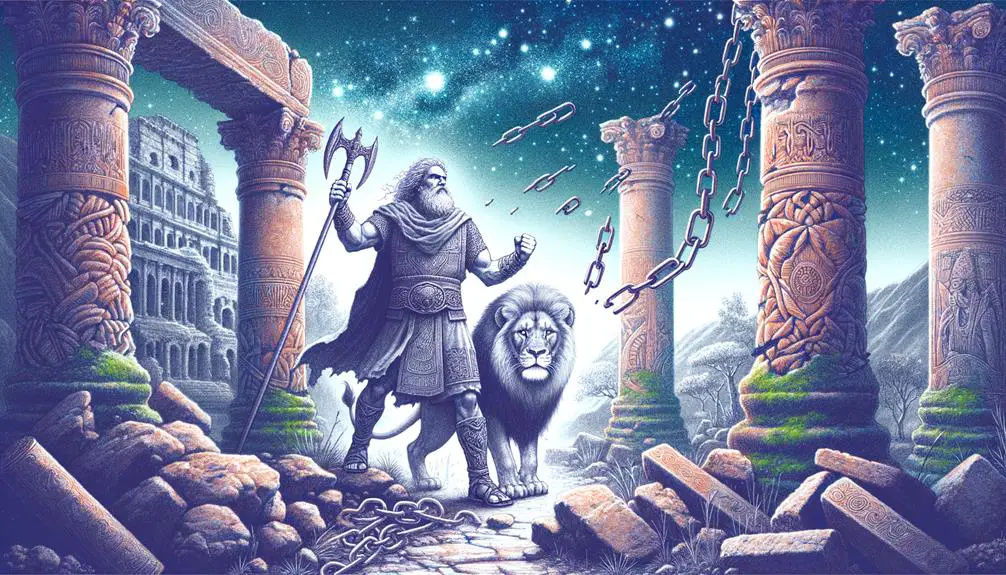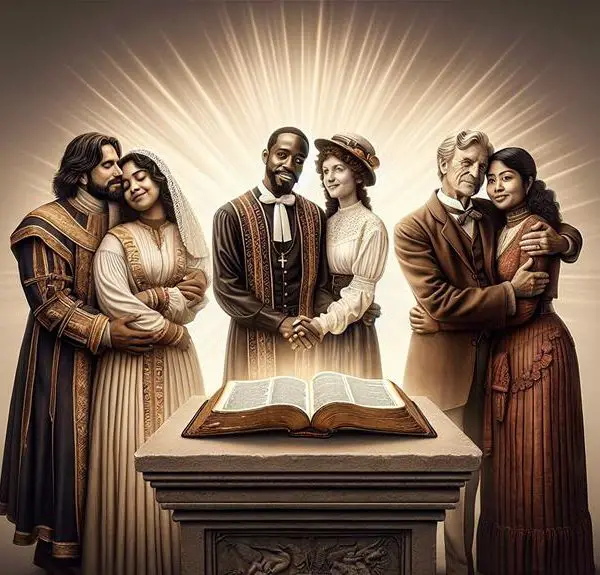Biblical strongmen, from Samson to David, embody not just physical might but deep spiritual strength, inviting us to explore what true power means.
Who Is the Strongman in the Bible
Nearly 75% of people recognize Samson as the quintessential strongman of the Bible, yet there's more to the story than his legendary feats of strength. You've likely heard tales of his exploits, but have you considered the deeper implications of strength and faith these stories convey?
By exploring characters like David, Goliath, and even Jesus, you'll uncover a multifaceted understanding of what true strength entails. This discussion invites you to consider not just the physical prowess, but the spiritual resilience depicted in these biblical narratives.
So, let's embark on this journey together and uncover the layers of meaning behind the Bible's strongmen.
Key Takeaways
- The term "strongman" symbolizes both physical and spiritual strength, often highlighted through battles against evil in biblical narratives.
- Samson is a classic example of a biblical strongman, showcasing extraordinary physical strength derived from divine blessing and his ultimate tragic downfall.
- Jesus represents the ultimate strongman, embodying spiritual resilience, transformative teachings, and strength in humility, love, and sacrifice.
- Spiritual strength and weakness are explored in the Bible, emphasizing mental resilience, faith, and the complex journey of spiritual growth and redemption.
Defining the Strongman

In biblical terms, the 'strongman' symbolizes a formidable force or entity, often representing spiritual adversaries that believers must confront and overcome through faith and divine assistance. This concept, deeply rooted in spiritual warfare, encourages you to recognize the power of faith in dismantling barriers and defeating the forces of darkness that seek to hinder spiritual progress.
Modern interpretations of the strongman have expanded beyond the confines of biblical texts, weaving into the fabric of contemporary Christian thought and practice. You'll find that sermons, theological discussions, and spiritual warfare literature frequently reference this concept, using it as a metaphor to address various forms of bondage or obstacles in a believer's life. It's a powerful reminder of the spiritual battles being waged and the victory available through faith.
Cultural representations of the strongman have also permeated art, literature, and media, often depicting the struggle between good and evil, faith and doubt, strength and weakness. These portrayals not only reflect the enduring relevance of biblical themes but also offer you a lens through which to view the ongoing spiritual battles in the modern world. By engaging with these cultural expressions, you gain insights into how ancient wisdom can be applied to contemporary challenges, encouraging a deeper exploration of faith's role in overcoming adversity.
Thus, understanding the strongman in both biblical and contemporary contexts enriches your spiritual journey, offering a nuanced perspective on the power of faith to overcome formidable challenges.
Samson: A Case Study
You'll find that Samson's narrative is a compelling exploration of extraordinary strength, its divine origins, and the human vulnerabilities that lead to downfall and eventual redemption. His story serves as a profound testament to the complexities of power and the potential for grace amidst failure.
As we examine these themes, you're invited to reflect on the interplay of divine providence and human agency within his life.
Samson's Extraordinary Strength
Throughout biblical history, Samson stands unparalleled in his display of physical strength, a testament to divine empowerment and human frailty. You might wonder how he achieved such physical prowess.
While it's critical not to delve into the source of his power—a topic for another discussion—fascination often turns toward his lifestyle, particularly his dietary secrets and haircare routines. Scholars and believers alike speculate if these aspects were merely symbolic or if they played a role in his physical conditioning.
His adherence to Nazirite vows, including abstaining from certain foods, suggests a disciplined lifestyle contributing to his strength. Similarly, his hair, often the focus of lore, raises questions about the intertwining of spiritual and physical vigor, leading one to ponder the balance between divine gifts and human responsibility in nurturing them.
The Source of Power
Having explored the lifestyle and personal disciplines of Samson, it's crucial to examine the true fountain of his unmatched strength. The origins of his power are deeply rooted in his covenant with God, highlighting a divine source rather than mere human capability. Analyzing this, we find:
- Divine Blessing: Samson's strength was a direct result of God's blessing upon him, a unique empowerment for a specific purpose.
- Nazarite Vow: His adherence to the Nazarite vow, particularly avoiding the cutting of his hair, symbolized his commitment and connection to God, which was crucial for his strength.
- Faith and Obedience: Despite flaws, Samson's moments of faith and obedience were pivotal in accessing his supernatural strength.
These elements collectively underscore the significance of spiritual devotion as the ultimate source of Samson's strength, setting a profound example of the origins of true power.
Tragic Downfall and Redemption
In the narrative of Samson, his tragic downfall emerges as a crucial turning point, illuminating the consequences of straying from divine guidance and the potential for redemption that follows. This phase of his life is steeped in moral ambiguity, challenging you to ponder the complex nature of his choices and their implications.
Despite his transgressions, Samson's story doesn't end in despair. Instead, it transitions into one of the most poignant redemption narratives within the biblical text. In his final moments, Samson's plea for strength to avenge his blindness symbolizes not only a personal vendetta but a return to faith. His ultimate sacrifice marks a redemptive closure, affirming that even in the face of grave errors, restoration and redemption are within reach.
Spiritual Strength and Weakness
Exploring the concept of spiritual strength and weakness reveals profound insights into the human condition as depicted in biblical narratives. You see, the tales woven through scripture aren't just historical accounts; they're reflections on the very fabric that constitutes our spiritual being. At the heart of these reflections are two pivotal components: mental resilience and emotional fortitude. These elements serve as the bedrock for understanding how individuals navigate their spiritual journeys amidst trials and tribulations.
To delve deeper, consider the following:
- Mental Resilience: It's the capacity to maintain a steadfast faith despite facing overwhelming odds. Biblical characters who exhibit this trait often find a way to persevere, their resilience serving as a testament to their unwavering belief in a higher purpose.
- Emotional Fortitude: This refers to the ability to manage and harness one's emotions in the face of adversity. In scripture, those who possess emotional fortitude aren't devoid of fear or sorrow; rather, they're adept at channeling these feelings in a manner that strengthens their spiritual resolve.
- Interplay Between Strength and Weakness: The biblical narrative compellingly illustrates that spiritual strength isn't an inherent trait but a dynamic state that fluctuates. Moments of weakness aren't depicted as failures but as opportunities for growth and deeper reliance on divine guidance.
Understanding spiritual strength and weakness through these lenses offers you a nuanced perspective on the complexities of faith. It underscores the importance of mental and emotional resilience as foundational to navigating the spiritual landscape, highlighting the transformative power of embracing both our strengths and our vulnerabilities.
Battles Against Evil

Throughout the Bible, individuals are frequently called upon to confront and resist evil, illustrating a profound spiritual battle that demands both courage and faith. This ongoing struggle isn't just a relic of ancient texts but continues to find resonance in modern interpretations, shedding light on the timeless nature of good versus evil. The stories of biblical strongmen tackling formidable foes aren't merely historical accounts; they're allegories that reflect the ethical dilemmas faced by humanity across ages.
As you delve deeper into these narratives, you'll notice that the battles against evil often transcend physical confrontations. They encapsulate the internal conflicts and moral choices that define the human experience. The strongmen of the Bible, with their remarkable feats, symbolize the potential within each person to overcome adversity through righteousness and steadfastness.
In today's context, these stories offer a lens through which to examine contemporary ethical dilemmas. They encourage a reflection on how one might navigate the complexities of modern life while upholding principles of justice and morality. The battles faced by biblical figures echo in the challenges encountered in the present, urging individuals to discern wisely and act courageously.
Hence, the biblical strongman's fight against evil isn't just a tale of physical prowess but a metaphor for the eternal struggle between right and wrong. It's a reminder that, across centuries, the essence of this battle remains unchanged, compelling individuals to confront their own ethical dilemmas with the same courage and faith demonstrated by the heroes of the Bible.
The Role of Faith
Faith acts as the bedrock upon which biblical strongmen anchor their resolve, guiding them through trials with unwavering certainty in the divine. This profound reliance on faith not only shapes their personal journeys but also underscores the broader narrative of overcoming adversity through divine intervention. Understanding the role of faith in these narratives requires an exploration of the intricate faith dynamics and belief systems that define biblical stories.
Here are three pivotal aspects to consider:
- Faith as a Source of Strength: For biblical strongmen, faith isn't just a belief but a source of supernatural strength. It empowers them to face seemingly insurmountable challenges, reinforcing the idea that with faith, all things are possible.
- Faith and Obedience: The correlation between faith and obedience is a recurrent theme. Strongmen demonstrate their faith through unwavering obedience to divine commands, even when such directives seem illogical or lead to personal sacrifice. This obedience is a testament to their deep trust in God's wisdom and plan.
- Faith as a Test: Often, the faith of these strongmen is tested, placing them in situations where their belief systems are challenged. These trials serve not to weaken but to refine and strengthen their faith, highlighting its dynamic nature.
In essence, the role of faith among biblical strongmen isn't a passive acceptance but an active, life-defining principle. It shapes their identity, dictates their actions, and ultimately, determines their legacy. Through their stories, we see the transformative power of faith and its ability to guide, protect, and inspire.
David and Goliath Revisited

You'll find that Goliath's formidable strength sets a stark backdrop to David's unlikely victory, a narrative that's rich in both drama and spiritual significance. As we examine this encounter, we consider not just the physical battle but also its symbolic interpretation, shedding light on themes of faith, courage, and divine intervention.
This analysis invites you to reflect on the deeper meanings embedded within this timeless story, urging a reconsideration of strength and power in the biblical context.
Goliath's Formidable Strength
In revisiting the biblical account of David and Goliath, it becomes evident that Goliath's formidable strength wasn't merely a function of his physical stature, but also a symbol of the seemingly insurmountable challenges faced by the Israelites. The narrative intricately interweaves Goliath's height and David's strategy, painting a vivid picture of the clash between underdog and titan.
- Goliath's height wasn't just a measure of his physical dominance but also an amplification of the fear and despair within the Israelite camp.
- David's strategy underscores the importance of wisdom and faith over brute strength, a pivotal theme in the biblical narrative.
- The encounter serves as a metaphorical battlefield where faith, courage, and ingenuity triumph over sheer power and intimidation.
David's Unlikely Victory
Against all odds, David's triumph over Goliath remains a testament to the power of divine intervention and human courage in the face of overwhelming adversity. This narrative, deeply embedded within the tapestry of biblical stories, showcases a profound lesson on the virtues of faith and the underestimation of the seemingly weak.
David's unlikely victory isn't merely a function of his shepherd's skill with a sling; it's a profound commentary on the interplay between humility and the divine. Goliath's arrogance, juxtaposed with David's humble reliance on God, underscores a pivotal theme: true strength often lies not in physical prowess but in spiritual resolve.
This story, therefore, isn't just about a battle won but about the triumph of faith over brute force.
Battle's Symbolic Interpretation
Delving deeper into the story of David and Goliath, it's essential to recognize the battle's rich symbolic layers, revealing much about the human spirit's triumph over seemingly insurmountable obstacles. This confrontation isn't merely about physical strength but embodies the essence of:
- Military tactics: David's choice of a sling over conventional weapons underscores the importance of innovation and adaptability in overcoming more powerful adversaries.
- Psychological warfare: By stepping forward to face Goliath, David disrupts the expected narrative, leveraging the element of surprise and instilling doubt in his opponent.
- Inner faith versus external might: The battle illustrates a profound belief in one's own abilities and faith, transcending the physical realm to achieve what appears impossible.
Through this lens, the story transcends its ancient origins, offering timeless insights into the human condition.
Jesus: The Ultimate Strongman

While many may regard physical prowess as the hallmark of a strongman, Jesus exemplifies strength through his profound spiritual resilience and transformative teachings. Unlike traditional strongmen who demonstrate their might in battles of strength and endurance, Jesus' power is revealed in his miraculous healings and parable teachings, resonating deeply with an analytical, reverent, and scholarly examination of his life. His healings weren't mere displays of power but profound manifestations of compassion and insight into the human condition, challenging societal norms and offering a new perspective on strength.
Jesus' parable teachings, rich in symbolism and moral depth, further underscore his unique approach to strength. These stories weren't just lessons; they were revolutionary ideas wrapped in simple narratives, accessible to all yet deeply challenging to the status quo. Jesus used these parables to convey the strength found in humility, love, and forgiveness, presenting a radical redefinition of power that wasn't about dominance but about service, sacrifice, and transformation.
This approach to strength wasn't without its challenges. Jesus faced opposition, misunderstanding, and ultimately, death. Yet, even in these moments, his strength was unmistakable. His resilience in the face of persecution, his commitment to his message of love and forgiveness, and his ultimate sacrifice speak volumes of a strength that isn't physical but profoundly spiritual and transformative.
Thus, in analyzing Jesus as the ultimate strongman, it's clear that his strength lay not in physical might but in his unwavering spiritual resilience, his revolutionary teachings, and his transformative impact on the world.
Legacy and Interpretations
Examining the legacy and interpretations of Jesus' teachings, it's evident that his influence extends beyond the boundaries of time, profoundly shaping both spiritual and secular realms. His parables and sermons, encapsulated within the gospels, have been scrutinized for both their historical accuracy and their profound cultural impact. This scrutiny reveals a multifaceted legacy that continues to inspire, challenge, and guide individuals and societies.
To make sense of this enduring legacy, consider the following aspects:
- Historical Accuracy: Scholars and theologians have long debated the historical veracity of the accounts of Jesus' life and teachings. Despite these debates, the core messages of love, forgiveness, and justice have transcended historical scrutiny, cementing Jesus' role as a pivotal figure in human history.
- Cultural Impact: Jesus' teachings have permeated cultures worldwide, influencing art, literature, and music. From medieval paintings to modern films, the narratives of Jesus' life and teachings continue to inspire creators, thus reinforcing his enduring influence across diverse cultural landscapes.
- Spiritual Guidance: Beyond the realms of academia and culture, Jesus' teachings offer personal solace and spiritual guidance. Millions find in his words a source of strength, hope, and moral direction, demonstrating the timeless relevance of his message.
In analyzing Jesus' legacy, it's clear that his teachings, irrespective of one's stance on their historical accuracy, possess a transformative power. They challenge individuals to reflect on their moral compass, inspire societies to strive toward greater compassion and equity, and remain a cornerstone of cultural and spiritual discourse.
Frequently Asked Questions
How Do Modern Interpretations of the Concept of the Strongman in the Bible Differ Across Various Christian Denominations?
Modern interpretations of the biblical strongman concept vary widely, reflecting deep denominational debates and interpretative diversity.
You'll find that some see it as literal historical accounts, while others view it metaphorically, emphasizing spiritual battles.
This divergence isn't just academic; it impacts worship and doctrine, showing how rich and complex biblical interpretation can be.
Delving into these differences, you gain a deeper appreciation for the multifaceted nature of Christian theology and its scholarly exploration.
Can the Idea of the Strongman Be Found in Other Religious Texts Outside of the Christian Bible, and How Do These Interpretations Compare?
You're exploring if mythological parallels to the strongman concept exist in texts outside the Christian Bible, analyzing cultural symbolism in these narratives.
It's fascinating to see how different religions interpret the strongman archetype, offering a rich tapestry of beliefs.
This analytical journey reveals the reverence societies hold for strength and leadership figures, providing a scholarly comparison of the values across cultures.
Such exploration deepens your understanding of universal themes in human spirituality.
What Psychological Implications Might the Stories of Biblical Strongmen Have on Contemporary Believers and Non-Believers Alike?
You might find that stories of biblical strongmen carry deep psychological implications, influencing both believers and non-believers. They serve as powerful symbols of personal empowerment, deeply embedded in cultural narratives.
These tales inspire resilience and determination, reflecting on one's ability to overcome adversity. Analyzing these stories through a reverent, scholarly lens, you notice their profound impact on the psyche, shaping moral values and personal identities across diverse communities.
How Have Depictions of Biblical Strongmen in Art and Media Evolved From Ancient Times to the Present Day?
You've noticed that artistic depictions of strong figures in religious narratives have dramatically changed due to cultural shifts and evolving artistic symbolism. Initially, these portrayals might've leaned towards literal interpretations, but over time, they've become more nuanced, reflecting contemporary values and insights.
This evolution mirrors society's changing perspectives on strength and morality, encouraging a deeper, more reflective engagement with these timeless stories across different eras and communities.
Are There Any Archaeological Findings or Historical Records That Corroborate the Existence or Feats of Biblical Strongmen Like Samson?
Diving into the past, you're seeking evidence of legends in the sands of time. While there's no direct trail leading to Samson's artifacts, archaeological digs have unearthed insights into Philistine culture, providing a backdrop for his story.
These findings, though not a smoking gun, weave a tapestry of the era, offering a scholarly, reverent nod to the narratives. They suggest a rich history where myth and reality might intersect, fueling your analytical curiosity.
Conclusion
So, who truly is the biblical strongman?
It's clear that strength in the Bible isn't just about physical might; it's deeply entwined with faith, moral integrity, and the battle against evil.
From Samson's raw power to David's courage and Jesus's ultimate sacrifice, each story reveals a different facet of strength.
Their legacies teach us that true strength comes from within and is magnified by our faith.
Isn't it remarkable how these ancient narratives continue to inspire and challenge us today?



Sign up